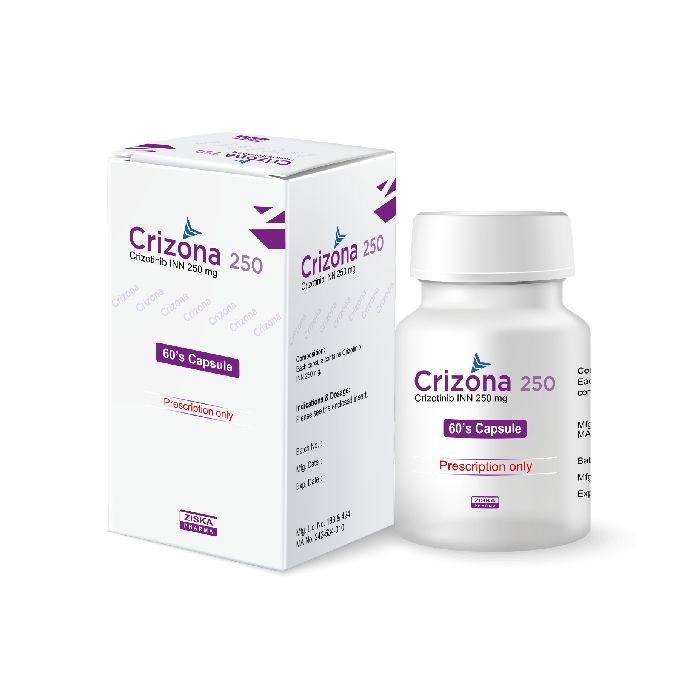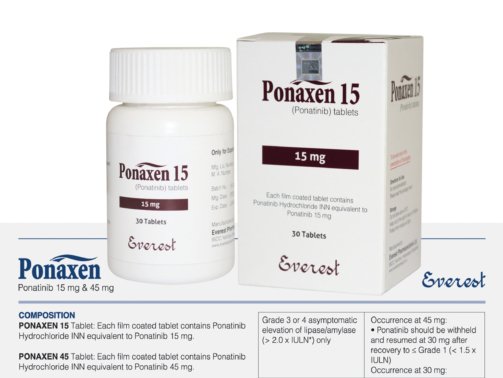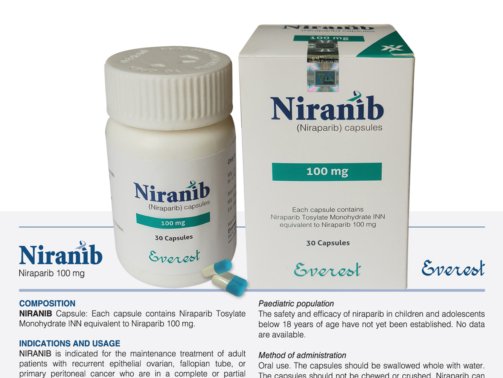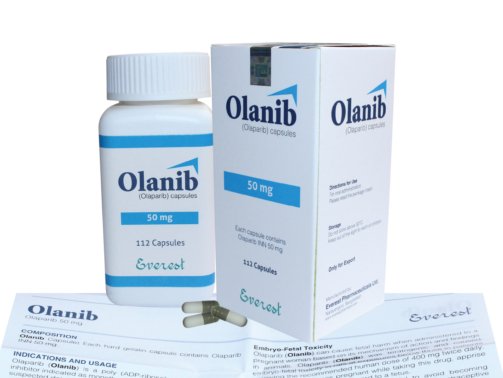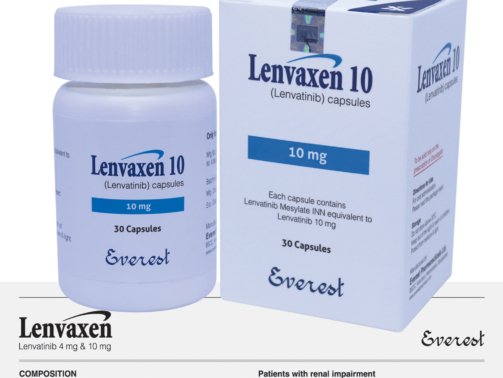Crizona 250 mg (Crizotinib)
Crizona (Crizotinib) 250 mg is a medication used in the treatment of specific types of cancer, particularly non-small cell lung cancer (NSCLC) and certain types of advanced or metastatic cancers. It belongs to a class of drugs known as tyrosine kinase inhibitors, which work by blocking the activity of certain proteins involved in cancer cell growth and spread. Crizona 250 mg targets abnormalities in the anaplastic lymphoma kinase (ALK) gene, providing a targeted therapy option for patients with ALK-positive cancers.
The active component of the prescription drug Crizona 250 mg is crizotinib, a targeted therapy that is mainly used to treat specific forms of non-small cell lung cancer (NSCLC). Crizona 250 mg, which is produced in accordance with strict pharmaceutical guidelines, belongs to a class of medications called kinase inhibitors, which function by preventing the activity of particular enzymes that encourage the development and metastasis of cancer cells. Those whose malignancies test positive for aberrant anaplastic lymphoma kinase (ALK) or ROS1 gene rearrangements benefit most from this therapy.
Mechanism of Action
Tyrosine kinase inhibitors (TKIs) are what Crizona (Crizotinib) does. ALK and ROS1, aberrant proteins seen in some cancer cells that promote unchecked cell division, are targeted and their activity is blocked. Through the inhibition of these proteins, Crizona aids in:
Reduce or halt the growth of tumors
Cause the demise of cancer cells
Stop the spread of cancer to other bodily parts.
Because of its precise targeting, Crizona is a type of tailored cancer treatment that is frequently suggested following the confirmation of ALK or ROS1 gene alterations by certain genetic testing.
Indications and Usage
Patients who are prescribed 250 mg of Crizona have:
Metastatic ALK-positive NSCLC
ROS1-positive NSCLC that has spread
It can be applied to patients who have not responded to previous cancer treatments or as a first-line treatment. To utilize Crizona, the tumor must undergo molecular testing to determine whether ALK or ROS1 gene rearrangements are present.
Dosage and Administration
The typical dosage of Crizona that is advised is:
Oral 250 mg twice a day, separated by around 12 hours.
Taking it with or without food is possible.
As long as there is clinical benefit and controllable harm, treatment should continue. Depending on the prescribing physician’s advice, dosage changes or temporary cessation may be necessary if adverse reactions develop.
Possible Side Effects
Crizona 250 mg may have adverse effects, just like any other medicine. Among the most typical adverse effects are:
abnormalities of the eyes (light sensitivity, impaired vision)
Vomiting and feeling queasy
Either constipation or diarrhea
edema in the feet or hands
Weariness
Increased liver enzyme levels
Lightheadedness or neuropathy
The following are serious but uncommon adverse effects:
Issues with the liver
Abnormalities in heart rhythm
Pneumonia and interstitial lung disease
Slowed heart rate, or bradycardia
lengthening of the QT interval (heart electrical disruption)
Patients should notify their healthcare physician right once if they experience any unexpected or severe symptoms.
Warnings and Precautions
The following should be taken into account prior to starting Crizona treatment:
Liver Function: Because crizotinib may cause hepatotoxicity, routine liver testing are necessary.
Cardiac Monitoring: Patients who are at risk of heart problems should have their heart rates and ECGs monitored.
Ophthalmic Monitoring: It is important to look into any ocular complaints as away.
Lung Assessment: Interstitial lung disease should be assessed for any new or worsening pulmonary symptoms.
Because Crizona may harm the fetus or baby, it is not advised to use it while pregnant or nursing. During treatment and for at least 45 days following the last dose, effective contraception should be utilized.
Drug Interactions
Crizona may interact with a number of different drugs. Crucial exchanges consist of:
Strong CYP3A inducers and inhibitors: May raise or lower the body’s levels of crizotinib.
Drugs that lengthen the QT may increase the risk of cardiac arrhythmias.
Certain antifungals and anticoagulants: Need close observation.
All medications, including over-the-counter medications and herbal supplements, should be disclosed to the patient’s healthcare provider.
Storage and Handling
Crizona tablets should be kept between 15°C and 30°C (59°F and 86°F) at room temperature.
To keep it safe from light and moisture, keep it in its original container.
Keep out of children’s reach and properly dispose of any leftover medication.
Conclusion
ALK- or ROS1-positive non-small cell lung cancer patients have hope thanks to the potent targeted treatment Crizona 250 mg (crizotinib). It is a key component of customized oncology treatment because of its capacity to accurately target the genetic causes of cancer progression. Many patients can benefit from increased progression-free survival and quality of life with consistent monitoring and medical management.
Like all cancer drugs, Crizona should only be used under a licensed oncologist’s supervision and as a component of an all-encompassing treatment strategy that is customized to the patient’s particular genetic and physiological characteristics.
Order Now At Mdx Pharma bd….
To order from MDX Pharma BD, visit their website at https://mdxpharmabd.com, where you can browse products and place orders online. For inquiries or orders via email, contact emedicarepharma@gmail.com. Alternatively, call (+88) 01929123476. Their address is 29, Abdullahpur, Uttara, Dhaka-1230, Bangladesh.
1. What is the purpose of crizotinib?
Crizotinib is used to treat non-small cell lung cancer (NSCLC) that has spread (metastasized) and is brought on by a mutation in either the ROS1 or the anaplastic lymphoma kinase (ALK) genes. The presence of this gene will be tested for by your physician.
2. Is chemotherapy inferior to crizotinib?
Crisotinib treatment led to a significantly longer progression-free survival, significantly greater response rates, a considerable decrease in symptoms, and a significant improvement in overall quality of life when compared to normal second-line chemotherapy.
3. Does crizotinib inhibit tyrosine kinase?
Crizotinib is a tyrosine kinase receptor inhibitor that is used to treat inflammatory myofibroblastic tumors (IMT), ALK-positive anaplastic large cell lymphoma (ALCL), and anaplastic lymphoma kinase (ALK) or ROS1-positive non-small cell lung cancer (NSCLC) tumors.
4. What is crizotinib’s success rate?
According to Supplementary Figure S2B, the median overall survival (OS) from the start of crizotinib was 53.4 (95% CI, 33.699−73.055) months. The corresponding 1-, 2-, and 3-year survival rates were 83%, 70%, and 57%.
5. What substitute is there for crizotinib?
Ceritinib (LDK378): a powerful substitute for crizotinib in non-small-cell lung cancer with ALK rearrangement. Clin Lung Cancer.
| Generic Name: | Crizotinib |
|---|---|
| Theraputic Category: | Anti-Cancer |
| Pack Size: | 60’s |

 Cart is empty
Cart is empty 